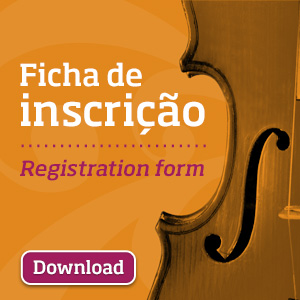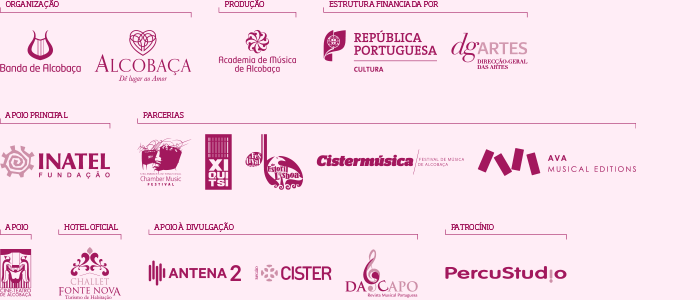They were among the big winners of the International Chamber Music Competition “Cidade de Alcobaça” in 2009 (Category A: average age below 20 years), the first edition of a competition that is today considered one of the most important of its kind in the country. An achievement that allowed Impressions Trio a whole new world of opportunities in the area of chamber music in Portugal and the chance to play in some of the most important places and events of our artistic midst as Belém Cultural Centre, Casa da Música in Oporto or Cistermúsica. Vera Santos, Rui Ramos and Bernardo Pinhal: here are the young men of an unusual trio in the field of chamber music (flute, clarinet and piano) that after almost two years tell us about the influence that winning the contest had in the ensemble’s course and their career as musicians. Plus: and they still leave us advices.
In 2009 you’ve won the first edition of the International Chamber Music Competition”City of Alcobaça (CIMCA): what was the feeling of that achievement?
Vera Santos: Speaking of my case, and I’m from Alcobaça, it was very encouraging to see the support of people from around here, family and friends. Being a first competition for chamber music in my native land, Alcobaça, it was quite important. As for Impressions Trio, it was a very significant achievement because we had only formed a few months before, in August 2008, and soon winning such a prize, after a short working time, it was very positive.
Rui Ramos: Boosted our group and our work, we began working with another cheer for the concerts that followed, which was very important.
One of CIMCA’s main goals is to promote young musicians and especially chamber music: how did the competition prize helped your ensemble’s career?
VS: We all had very little experience in chamber music by this time and I feel it opened some doors to show houses where important for us and that otherwise we would not have the chance, and even more at this point, when we can do concerts, recitals and so on. In our life as musicians is very important to play chamber music, because we know that the life of musicians in Portugal is not easy; they can play at orchestras, they can play chamber music, but only those who are very good have the opportunity to do other things and other projects, so it was very important, it gave us a great experience that I do not think we would had and now we have.
“[The victory at CIMCA 2009] opened some doors to show houses where important for us and that otherwise we would not have the chance […] to do concerts, recitals and so on”
After two years, do you still feel that this victory was decisive in your career as musicians?
VS: Yes, I think so, because otherwise we would not had evolved so much, I think, because one thing that chamber music brings to the great musicians is the ability to be able to interact with each other, to get acquainted with people whom we work, not only personally, musically as well, and that makes us grow either.
RR: Basically, it allowed us to meet more people, new media, both here in Alcobaça, where we participated in Cistermúsica – Music Festival Alcobaça, and at the organization of the competition, which was a very good organization. It expanded the level of our knowledge, which was important. As an instrumentalist was also important because the chamber music, as Vera said, is a path and a future in which we invest, an invest that matters. That was our choice …
VS: … and that gives us great pleasure. Throughout the concerts I felt our evolution: logically we are still at an age of evolving as musicians and every concert we went we felt better than the previous one, we felt that the impact on individuals was getting bigger and better. We played in Lisbon, Oporto, in Algés, had contact with different audiences, different age groups, various statutes within the world of music, there were people who heard us related to music and there were people who had no idea who we were, of our history and I felt that the impact was very positive, all of this due to the competition.
RR: And we were always well received everywhere.
Besides the prize money, the opportunities of the reward was precisely the possibility, already mentioned by you, to play in the Cistermúsica, Casa da Musica in Porto and Belém Cultural Centre (CCB): how were these concerts and how important were in your case?
VS: I would like to talk about precisely our first Cistermúsica concert, at Igreja Paroquial of Santo André, near Alcobaça, where I had the opportunity to have many friends in the audience and lots of family. I felt very accomplished and very well to have a recital with two people very close to me, Rui [Ramos] and Bernardo [Pinhal], which allowed me to show the work that I had been developing in school until that time and my own evolution in musical terms. At CCB, I think it was a fantastic experience because the room was full, with no place for even one more person, and also during Days of Music, when there’s always a lot of people circulating in the CCB, which I think it was a great experience.
RR: The public was completely different, each room received us differently, especially at Cela, where Vera was pretty much at home and we were very warmly received. I think that was the concert that gave us more excitement.
VS: At Casa da Música it was a bit different, it happened later and only last November, we already had another repertoire and we were different, here we premiered a piece that a composer friend of ours wrote and dedicated to us, Daniel Moreira. The expectations were different, the public was another, completely different. But beyond these concerts that we had thanks to the competition, we were also invited to give a concert at Palácio dos Anjos in Algés last year, where we were also very well received, a concert that went very well. All these three concerts, as Rui was saying, were concerts that touched us in different ways, with different audiences, different expectations, but all very enriching.
“One thing that chamber music brings to the great musicians is the ability to be able to interact with each other, to get acquainted with people whom we work, not only personally, musically as well, and that makes us grow either”
Do you feel the need for more competitions of this kind in Portugal?
VS: Yes, I think it is very important and until now I don’t know another one of this kind, I think there is one in Póvoa do Varzim, but with the prestige and ability to bring international musicians I do not think there is another one in Portugal. And as I began by saying, the life of a musician in Portugal is very complicated, or you have the chance to play in orchestras or teaching music, which is also enriching, maybe not for all musicians, but most of them, the chamber music remains very present in our lives and is a way to encourage people to devote themselves more to chamber music and to take more advantage of it, it’s a wonderful world.
RR: And it’s also one of the few possibilities for a person to remain linked to an instrument since competitions and orchestras are not for everyone. One way to stay connected to an instrument is doing chamber music and it is important to invest in it through competitions that with this relevance are so few in Portugal.
And now, what balance do you make of your career?
VS: As I said, the chance to have a piece dedicated to us, it was a huge achievement and especially from a composer who last year was the resident composer of Casa da Música, a status that is very hard to achieve and very important. For us it was an honor, because it is also a person close to us and a special friend of ours, it was an important moment for us. As a group, our goal is to continue working, continue to participate in competitions, try to do concerts, seeking to expand the repertoire for our ensemble, because our ensemble is not very usual: clarinet, flute and piano, is not quite as a string quartet composition or a woodwind quintet, which can have a repertoire from many composers and I think it is important to enrich the repertoire because our ensemble has many possibilities and sounds. At least, we like.
RR: It is our intention to help expand a bit this repertoire, which is very limited, and that, besides the XX century French music, has not much to do beyond of what we already have done.
“We are still at an age of evolving as musicians and every concert we went we felt better than the previous one, we felt that the impact on individuals was getting bigger and better”
And now, what scenario do you portray of chamber music in the country?
VS: I properly think that there aren’t many groups with much success in Portugal, because I feel that the public still doesn’t accepts very easily chamber music or goes to a concert with the purpose of watching “that” group. Or you have an exception, as, for example, the Matosinhos String Quartet or any other group that has already taken a history and a name, or besides these few groups is very difficult for a person to predispose himself to go see a chamber music concert. I think that is, in fact, a gap in Portugal, because one thing is to go see an orchestra, which is an impressive thing and mostly everyone likes to go see, but chamber music has not yet grown roots in our culture in Portugal and that I think it’s a shame.
RR: Despite the fact we have quality groups in Portugal.
As a trio, how are your relationships established within the group artistically? How do you decide which pieces to play? Or how do you manage to reconcile your schedules in favor of the ensemble?
RR: As for the repertoire, it is not very difficult to choose what to play because of the shortage. Therefore, there is little more besides of what we actually have in our repertoire. Regarding our agenda, is a bit tricky because we come from three corners of the country. I am from Mirandela, Vera is from Alcobaça and Bernardo from Matosinhos, and we had one thing in common which was the Music School of Porto, but now, after we have completed our courses, is not so easy to reconcile because of our jobs.
VS: But we try and do so. Regarding the repertoire, we started to work on things that were suggested by a teacher, our chamber music teacher, Raquel Lima, so it was easy to start, since the teacher as a lot of experience and knows repertoire; it was her who adviced us this type of repertoire. Now, about the repertoire that still remains and we have not yet worked, usually we reunite, schedule a date to read it, in a funny way, just to see if it is worth working or not and whether it is a proper choice for us. We work as a democracy, between three, and none of us imposes himself in such a way, we always try to work things that give us pleasure and that we think will bring us good musical moments.
“As a group, our goal is to continue working, continue to participate in competitions, try to do concerts, seeking to expand the repertoire for our ensemble”
As mentioned, in addition to the ensemble, each one of you has other projects and activities: can you tell us something about this?
VS: We’re both teaching and Bernardo also, but now I’m currently taking a Master, Bernard is finishing his degree and for now, I think I speak for the three, our life basically boils down to study, teach and rehearse as a trio. Let’s say that currently we do not have much time for other projects. Both I and Bernardo still continue to study, which really takes us a long time. Rui has stopped for the moment, but his expectations are to continue studying, so I think in the near future, at least the next two years, maybe we will not be able to have more time for other projects, but Trio Impressões maintains his expectations in keep making music.
RR: And the hardest thing has been done, therefore, it would be now a crime to abandon the trio.
But in practical terms, do you have any plans for the future?
RR: In concrete terms, we still have no plans.
VS: We have the idea to participate in competitions in Spain and Italy, we’ve been talking about it and we are collecting material for further work, basically it.
Finally, what kind of advice do you have for future participants of CIMCA?
VS: Above all have fun as much as us. Because both the eliminatory rounds and the concerts, wether at the Winners Concert or in Cistermúsica, CCB and Casa da Música, I think that above all we had a lot of fun playing together and we felt what we were doing, and I think this is the most important. To feel what you’re doing, not playing just because you’re playing, feeling truly that you are doing something of value and transmit the energy of the group to the public, as for the jury and for those who are listening to.
RR: And as a person, to absorb everything there is to absorb in the contest, where you have the chance to hear wonderful groups who play very well. That’s what we did and we learn a lot in this contest just by hearing other groups.
Impressions Trio, young chamber musicians
Trio Impressões are a project that emerged during the summer of 2008 when Bernardo Pinhal, Rui Ramos and Vera Santos, students of Escola Superior de Música e Artes do Espectáculo do Porto (ESMAE) participated in the International Stage Orchestra directed by conductor Jean Sebastien Béreau. Quickly they realized that they had common interests and, studying in the same school, had the opportunity to develop an interesting project to add to his musical training. So, under the guidance of Professor Raquel Lima, they associated this idea to the subject of chamber music, where it emerged Trio Impressões. The participation on the first edition of the International Chamber Music Competition “Cidade de Alcobaça” was an early objective of the group and a goal to achieve. The fact that they hadreached the first place in Category A has since become a major incentive for the group, reinforcing their strong desire to continue working even outside tschool, and promoting the existing repertoire for this ensemble (and even extending it) pointing out all its beauty and quality.
Photo courtesy from on-line newspaper Tinta Fresca




